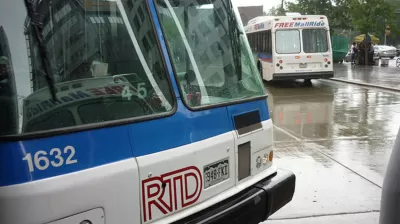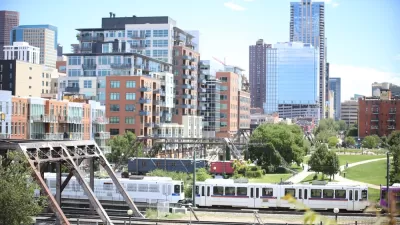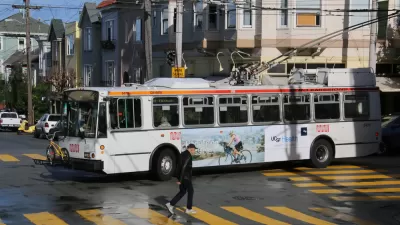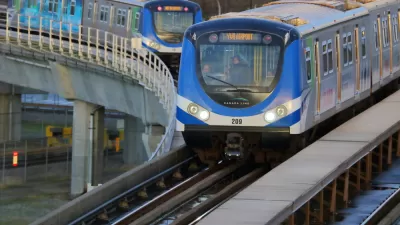As Colorado's Regional Transportation District plans for the 2021 budget, over 800 jobs could be cut as in attempts to regain financial losses caused by the coronavirus.

Facing a projected $166 million budget deficit for 2021, Colorado's Regional Transportation District (RTD) plans to cut over 800 positions to make up for the shortfall, reports Nathaniel Minor. The cuts are part of a budget proposal that will be presented to the board this week.
"RTD had struggled for years to fully staff those positions before the pandemic hit, and now it can’t afford them," writes Minor. According to Amalgamated Transit Union-1001 president Lance Longenbohn, the decision to go public with the plan is influenced by the understanding that if the cuts happen, the agency will have a hard time rehiring for these positions and will create difficulty regaining financial stability.
Minor reports on the makeup of the positions on the chopping block stating that about 500 "bus drivers, light rail operators and mechanics" would be put out of work while only about 120 administrative positions would be eliminated.
The Amalgamated Transit Union-1001 published a press release stating that the disparity shows that "RTD continues to value its over-paid managers over front-line workers."
RTD cut 40% of service in April and Minor reports that ridership is still down by about 60%. The agency is currently planning service changes that continue operations in transit-dependent communities. Minor says that service cuts are likely in lesser-used routes in the coming months.
FULL STORY: RTD Plans Big Staffing Cuts As Coronavirus Decimates Budget

Planetizen Federal Action Tracker
A weekly monitor of how Trump’s orders and actions are impacting planners and planning in America.

Maui's Vacation Rental Debate Turns Ugly
Verbal attacks, misinformation campaigns and fistfights plague a high-stakes debate to convert thousands of vacation rentals into long-term housing.

San Francisco Suspends Traffic Calming Amidst Record Deaths
Citing “a challenging fiscal landscape,” the city will cease the program on the heels of 42 traffic deaths, including 24 pedestrians.

Amtrak Rolls Out New Orleans to Alabama “Mardi Gras” Train
The new service will operate morning and evening departures between Mobile and New Orleans.

The Subversive Car-Free Guide to Trump's Great American Road Trip
Car-free ways to access Chicagoland’s best tourist attractions.

San Antonio and Austin are Fusing Into one Massive Megaregion
The region spanning the two central Texas cities is growing fast, posing challenges for local infrastructure and water supplies.
Urban Design for Planners 1: Software Tools
This six-course series explores essential urban design concepts using open source software and equips planners with the tools they need to participate fully in the urban design process.
Planning for Universal Design
Learn the tools for implementing Universal Design in planning regulations.
Heyer Gruel & Associates PA
JM Goldson LLC
Custer County Colorado
City of Camden Redevelopment Agency
City of Astoria
Transportation Research & Education Center (TREC) at Portland State University
Jefferson Parish Government
Camden Redevelopment Agency
City of Claremont





























